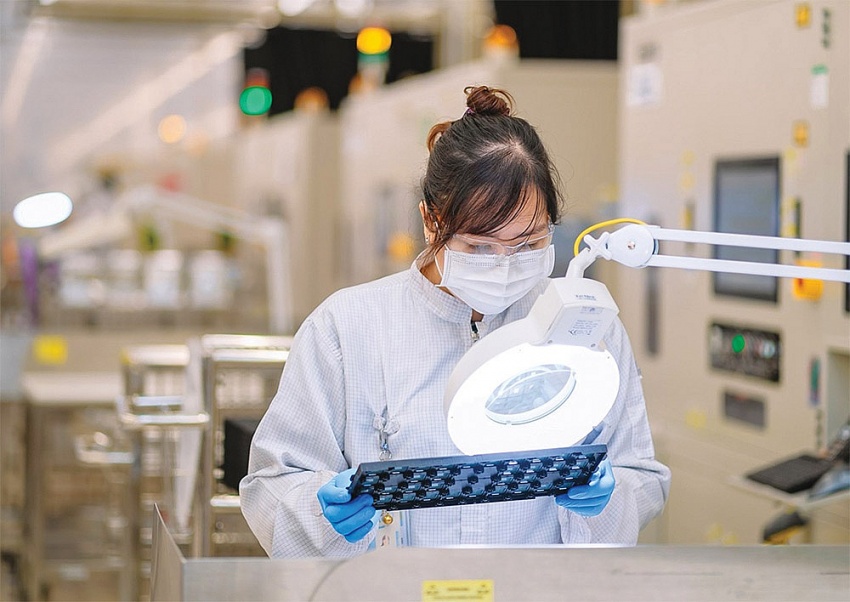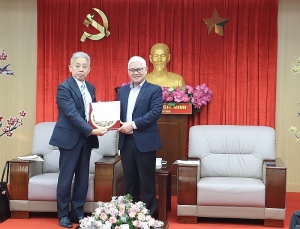Chip industry taking on new players
 |
| Research groups are making investments or boosting operations, photo Le Toan |
Last week, the Ministry of Information and Communications delivered the draft strategy on developing Vietnam’s semiconductor industry to 2030 to all ministries, agencies, and foreign and local associations, to gather opinions for the second time before submitting it for approval.
The strategy sets out several targets for the industry. Firstly, Vietnam has to become a country with a developed semiconductor industry, and one of the important factors in the supply chain of global semiconductors. Secondly, the country will develop and complete infrastructure in the industry, including human resources, technology, research and development, production, and application, contributing to the sustainable development of Vietnam’s digital tech industry.
Last week, during a visit to Viettel Group’s headquarters, Prime Minister Pham Minh Chinh highlighted the role of the semiconductor industry among high technologies at present, and asked Viettel to invest more resources into the industry.
“Viettel has to develop the semiconductor industry more effectively and make it diversified,” the PM said.
Foreign investors are eyeing the Vietnamese semiconductor industry. Most recently, US-headquartered semiconductor manufacturer Analog Devices Inc. revealed its plan for raising investment in the country.
“Vietnam is an important market in our strategy, and we are planning to increase our investments in the near future, especially in the e-vehicle chip segment. Currently, we are finalising our plans in Vietnam, building strong customer relationships, and improving our design and manufacturing capabilities,” said Daryl Wan, the company’s sales director in South Asia-Pacific.
Vietnam is rapidly becoming a key player in the semiconductor industry, driven by growing demand for e-devices and significant development of infrastructure, Wan added.
“Strategic geographical location and competitive human resource costs have attracted foreign semiconductor manufacturers to invest and expand operations here. Moreover, taking advantage of geopolitical independence and foreign investment are the foundation for Vietnam to become a technology hub,” he said.
He emphasised that one of Vietnam’s main opportunities was in chip assembly, a key area to meet industry demand and reduce the over-concentration of production capacity in China and Taiwan, which currently account for 60 per cent of global capacity.
Meanwhile, Chinese investor Victory Giant Technology is planing a large project in Vietnam. In mid-March, when a delegation of the northern province of Bac Ninh visited China to promote investment and visit the headquarters of Victory Giant Technology, a land lease agreement was signed.
This will set up a factory specialising in manufacturing printed circuit boards, with an investment of about $800 million in VSIP2. If everything goes smoothly, the factory be put into operation next year.
American chip-making technology provider Lam Research Corporation is also keen on building factories and developing a supply chain within Vietnam’s semiconductor industry. At a meeting with PM Chinh at the end of March, group vice president Karthik Rammohan said it was looking to expand its operation and diversify its supply chain in Asia.
“In Vietnam, Lam Research plans to tie up with Seojin from South Korea, which has factories in Bac Ninh and Bac Giang provinces, to develop factories and a supply chain with capital of $1-2 billion in the first phase,” Rammohan said.
“Following the first phase, Lam Research will possibly make direct investments or bolster its operations in the country. We would like to research the investment promotion policies and initiatives that Lam Research can join to support suppliers and the supply chain of Vietnam’s semiconductor industry,” he added.
Previously, at the fifth National Forum on Digital Enterprises Development last December, Minister of Information and Communications Nguyen Manh Hung emphasised that the semiconductor industry was fundamental, and a key national industry for the next 30–50 years.
“When developing the semiconductor industry, we should look at the bigger picture. The semiconductor chip design market, the semiconductor industry, or even the electronic industry are valued at only $60 billion, $600 billion, and over $3 trillion, respectively. However, the digital transformation industry is worth $20 trillion.” he said.
 | Diversification giving boost to chip targets More semiconductor players are planning to diversify their supply chain to Vietnam, reinforcing the country’s importance as an assembly and packaging hub for the chipmaking industry. |
 | South Korea to invest $7 billion in AI by 2027 South Korea will invest almost $7 billion in artificial intelligence by 2027 in an effort to become a global leader in cutting-edge semiconductors, President Yoon Suk Yeol said Tuesday. |
 | Japan's Tokyu researches semiconductor technology in Binh Duong Japan's Tokyu Group has established research teams to explore investments in a number of new fields such as high technology and semiconductors in the southern province of Binh Duong. |
| Support rises in semiconductor chip development in Vietnam In recent times, Vietnam has completed the legal corridor to create conditions prioritising investment and development of semiconductor chips. The Law on Investment and the Law on Corporate Income Tax have added special incentives for high-tech and large-scale projects, including chip production ones. |
What the stars mean:
★ Poor ★ ★ Promising ★★★ Good ★★★★ Very good ★★★★★ Exceptional
Related Contents
Latest News
More News
- SK Innovation-led consortium wins $2.3 billion LNG project in Nghe An (February 25, 2026 | 07:56)
- THACO opens $70 million manufacturing complex in Danang (February 25, 2026 | 07:54)
- Phu Quoc International Airport expansion approved to meet rising demand (February 24, 2026 | 10:00)
- Bac Giang International Logistics Centre faces land clearance barrier (February 24, 2026 | 08:00)
- Bright prospects abound in European investment (February 19, 2026 | 20:27)
- Internal strengths attest to commitment to progress (February 19, 2026 | 20:13)
- Vietnam, New Zealand seek level-up in ties (February 19, 2026 | 18:06)
- Untapped potential in relations with Indonesia (February 19, 2026 | 17:56)
- German strengths match Vietnamese aspirations (February 19, 2026 | 17:40)
- Kim Long Motor and AOJ Suzhou enter strategic partnership (February 16, 2026 | 13:27)

 Tag:
Tag:
















 Mobile Version
Mobile Version